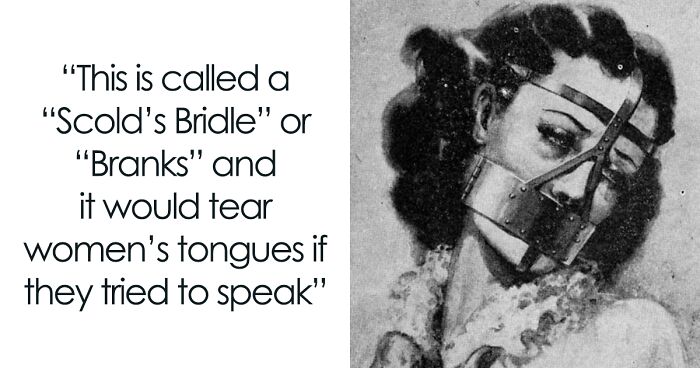
Woman Explains Why Gossiping Was Stigmatized By Men And Many Agree Her Opinion Has Great Points










Lara Lee Kelly, aka Lanthane Radium, is on a quest to dismantle what she calls deeply engrained misogynistic propaganda. One of her latest targets is gossiping.
In an attempt to rehabilitate it, the 20-year-old returned to the roots of the term and its evolution over time, presenting the findings of her research in a two-part TikTok miniseries. As of this publication, her videos have over 4 million and 350 thousand views. Clearly, people are interested.
Continue scrolling to check out Kelly’s take on gossiping and let us know what you think about it in the comments.
Recently, TikTok user Lanthane Radium posted a two-part TikTok miniseries on gossiping
@lanthane_radium#greenscreen follow me here & on insta to unlearn some more stuff the patriarchy has taught us! Pt. 2 is up!♬ original sound – Lara Kelly
And the videos already have a combined 4.3 million views
@lanthane_radium#greenscreen Pt. 2! follow me here & on insta to unlearn some more stuff the patriarchy has taught us!♬ original sound – Lara Kelly
Image credits: Rose-Aimée Bélanger
According to Art Public Montreal, Rose-Aimée Bélanger’s inspiration comes “from the simple moment of everyday life. In her feminine sculptures, her ’rounds’ as she likes to call them, the expression of the eyes is essential to their understanding and appreciation. The emotions are amplified by the sensuality of the curves.”
Les Chuchoteuses is a 2002 bronze sculpture depicting three women, completely absorbed by their conversation. The work was installed as part of an initiative to highlight some of Old Montreal’s forgotten spaces.
ADVERTISEMENTThe earliest known use of this creepy contraption was in Scotland in the 16th-century to punish and humiliate women who were labeled as scolds or nags.
The Houghton Library at Harvard University claims it “was usually an iron muzzle within an iron framework that would go around the head along with a bridle-bit that would go in the mouth and press down on the tongue- thus effectively silencing the offender.”
Though some sources indicate that this was just a punishment for women, the Burgh Records of Scotland’s major towns reveal that the branks were at times used on men as well: “Patrick Pratt sall sit … bound to the croce of this burgh, in the brankis lockit” (1591 Aberd. B Rec. II. 71) / “He shall be put in the branks be the space of xxiiij houres thairafter” (1559 (c 1650) Dundee B. Laws 19.)
Image credits: Ben Healy
As Sophia Gottfried pointed out in TIME, people usually think of gossip as synonymous with malicious rumors, put-downs, or the breathless propagation of a tabloid scoop. Researchers, however, often define it more broadly.
For example, Megan Robbins, an assistant professor of psychology at The University of California, Riverside, calls it “talking about people who aren’t present.”
“It’s something that comes very naturally to us.” Robbins says gossiping is an integral part of conversation, information sharing, and even community building.
In a 2019 meta-analysis published in the journal Social Psychological and Personality Science, Robbins and her colleague found that, of the 52 minutes a day on average the 467 subjects spent gossiping, three-quarters of that gossip was actually neutral.
One subject, for instance, spoke about someone who was watching a lot of movies to stay current. “It was kind of boring,” Robbins explains, “not salacious and negative” at all.
But negative gossip was twice as prevalent as positive. The results also revealed that younger people engage in more negative gossip than older adults.
Gossip was overwhelmingly about an acquaintance and not a celebrity.
As you might think, extroverts tend to gossip far more frequently than introverts.
Image credits: Anna Sheffer
Image credits: lanthane_radium
Here’s what people said after watching the videos
Anyone can write on Bored Panda. Start writing!
Follow Bored Panda on Google News!
Follow us on Flipboard.com/@boredpanda!

As a Visual Editor at Bored Panda, I indulge in the joy of curating delightful content, from adorable pet photos to hilarious memes, all while nurturing my wanderlust and continuously seeking new adventures and interests—sometimes thrilling, sometimes daunting, but always exciting!
Read less »
Mantas Kačerauskas
Author, BoredPanda staff
As a Visual Editor at Bored Panda, I indulge in the joy of curating delightful content, from adorable pet photos to hilarious memes, all while nurturing my wanderlust and continuously seeking new adventures and interests—sometimes thrilling, sometimes daunting, but always exciting!

Read more »
Rokas is a writer at Bored Panda with a BA in Communication. After working for a sculptor, he fell in love with visual storytelling and enjoys covering everything from TV shows (any Sopranos fans out there?) to photography. Throughout his years in Bored Panda, over 300 million people have read the posts he's written, which is probably more than he could count to.
Read less »
Rokas Laurinavičius
Writer, BoredPanda staff
Rokas is a writer at Bored Panda with a BA in Communication. After working for a sculptor, he fell in love with visual storytelling and enjoys covering everything from TV shows (any Sopranos fans out there?) to photography. Throughout his years in Bored Panda, over 300 million people have read the posts he's written, which is probably more than he could count to.
Gotta say, I disagree with this post. Gossip can have terrible consequences, because it can create and reinforce social stigma and exclusion. There is also nothing on here that says the gossip is always truthful--it isn't. I've suffered consequences in my community, family and place of work because of gossip, a lot of which was absolute fiction. It is destructive, not empowering. And it's not exclusive to women, so let's not turn it into female empowerment.
I am with you; calling bullshit on this post. My wife worked in an office about 95% women, and it was a toxic space with gossip and lies making life hell for her and others. She has worked in a number of offices, and not all were bad; just that a few nasty folks can take 'coffee talk' or 'water cooler scuttlebutt' and turn it into 'Mean Girls'. This was in predominantly female work spaces. Where she worked in predominantly male groups, this NEVER occurred.
Load More Replies...It seems like the problem is her if she can't get along with 95% of her workmates. I work where men are the majority, they are very gossipy and vicious.
I haven't had issues with women in my field (graphic design and online learning production), but it's possibly because they're not overly conventional in the first place (so maybe more tolerant of differences), any criticism is focused on work, and working well with others is prized. Because technology changes, the ability to learn and adapt is more important than what someone wore three days in a row. There are men in our office, but our bosses are women and they're lovely.
I'm with your wife on this one. Much prefer working with males. You have a disagreement, the next day everyone is back to normal, with females 3 months later and they are still being toxic.
Another situation: doing massage diploma, being sat in a room during orientation and made to watch a video talking about sexual harassment, in which every example the perpetrator was a male - whether the victim was a female or a gay male - while being at that point the only male in the room. Government run institution, btw. Not just some hack, rogue scam college. An institution that has a better reputation for providing graduates who are thoroughly educated and fully prepared for their respective industries than the best Universities we have - by far. And those Universities are themselves world-class and relatively high up on the list. And in a group of apparent adults where I was always avoided when we were asked to pair up, and then even when there was a second guy, an older, very likeable smaller guy with the easy going, friendly, self-confident nature of a waxhead, matured and now a retired professional tradie, that even the more timid females seemed very comfortable with, still the teacher had to force the females to pair up with us (important to practice on many different bodies). Then the gossip and the ways the girls would group up and kind of go off and shut others out. And the comments and remarks about my body. The intensity of scrutiny of my body while the other guy was hardly glanced at or remarked upon (supposed to be making visual assessment of posture) while we're standing there in our underpants. (I swear, they were making themselves and one another so uncomfortable not noticing that I'm a guy with a guy's body with guy bits that they lost sense of time and easily a full five minutes were spent intently not looking while examining my lower half. This comedic and awkward lengthy gazing with intent concentration. All they needed to say was "you stand heavy on your left foot, hips slightly tilted laterally, knees somewhat in extension, stance is wide and feet turned out". They'd glance at the other guy and asses him in seconds. Then we'd turn 90° and they'd do it again.) The relief that we agreed to be the models and the insinuation that it's so much better that a guy do that in a room full of females than a female in front of two guys and the rest females... with that insinuation being made by the teacher (subtly stated but in not quite so many words). (In fact, several of the females were very confident and even seemingly eager to stand as models at other times). The bewildering doe-eyed over-attentiveness at times from certain females... From that beginning to that larger experience... Man, talk about f*****g surreal. Oh, and try and explain to these automatons that their anti-discrimination material was really quite discriminatory (not simply just sex but race and everything else we've all learned from our parents and then grown up with having forcibly shoved down our throats since our first day in school, even the suggestion that adults absolutely and necessarily need this education at a diploma level, and even in its aim and methods and just its overall implication, and that everyone must expect the exact same kindergarten explanation of people and the world around them and exactly what's expected of them and exactly what thoughts and opinions aren't tolerated with in all that situation of tolerance and understanding because we're all adults and different and so there can be only one way to look at it...). Their eyes just glaze up. I could see that this silly thing was kind of getting it by the end of the conversation but she just wasn't having it. Overall, it might not be a fair comparison because I think people go into that course with very unrealistic, head-in-the-clouds expectations then get hammered with a f*****g intense, full-on, hardcore course that expects a very significant effort and fairly high degree of knowledge to be acquired in a very short time, and very high standards of performance and professionalism, that it kind of puts people on the back foot a bit. Destablises them, disorients them. And then they're swimming in a kind of vague foggy world of chaos spoken in Latin. But the way the course is delivered, the insinuations and implied beliefs, the cognitive dissonance and double-speak, the double standards, the patronisation and self-adulation... man, people are just off with the f*****g fairies. Human knowledge is becoming more advanced, in some ways, but I'm close to convinced that people themselves are in general becoming less coherent. You can almost see it happen day-by-day. What a f*****g rant. One of my best.
I've worked in live sound, warehousing and logistics, and hospitality. In every one there's been f****d up people to work with. Hospitality has been most frequently consistently unpleasant, but I've never been man-handled and given serious threats in a room full of people preparing for a celebration by a guy small guy with a big ego and a level of hormones and neurotransmitters fit to serve a physique that was well beyond his capacity to control and who was feeling the non-existent pressure in any but live music (I was 17 and skinny at the time, struggling to keep up with the heavy lifting, and he was well over 40 and ripped - boss' cousin, Italians - boss himself was barely taller than an average person's diaphragm but practically had to walk through a door sideways and was still a tight fit, but he was heaps chilled out and really good to me - his cousin was something completely different, but he was his cousin). Hospitality, it's usually just a few hours of someone belittling others - usually service staff - because they're feeling the non-existent pressure. Never really had them giving it to me. Maybe once or twice. Warehousing was the cruisiest, but even there there was this kind of subtle background game of "Who's the boss" going on. And physical s**t has never come from women. What has come from women tends to be these insidious mind games and stealth attacks that result in job loss. And they also tend to happen in the context of absolutely f*****g nothing. So, my experience is that I've had guys being pretty f*****g intense at times when the pace is on but at the end of the day everyone's fine and life goes on, but women will never let it lie, will escalate things, pulling strings behind the scenes, and eventually someone disappears. There have been some great women I've worked with, and some f*****g awesome guys, but if I had to choose it'd be blokes all the way. And I don't even really like guy-culture, to be honest. All of my good friends are generally very modest and friendly but confident, where most "bloke-culture" seems loud and showy and seems to come from a lack of identity and confidence. Can't stand that s**t. And it's so common that over time it started to look like that the lack of identity and self-awareness was me, but really I was just not prepared for the degree that it occurs in general and took me a long time to figure it out. Still confuses me and disorients me a fair bit. Having to work in groups of guys of adult age that act like kids trying to outdo one another in order to maintain a degree of respect, where the most interesting thing someone has to talk about is this week's favourite s**t band or some chick they shagged or how drunk they got the other night and aren't they just the f*****g maddest c**t because of it... gotten old as dust. And females do exactly the same, but in their own style. Nuh. It's not men are worse or women are worse. It's that people are generally s**t and true kin, your own species, are very rare unless you happen to be one of the common variety - the mongrel breed.
Mostly agree with you. I work in an environment with 10 men and 1 woman. And 2 of the 10 guys are the kinds that spread rumors and are toxic af. Everybody else is super chill and the 1 woman we have is very strong-willed and takes no s**t from any of us. I have also talked to a lot of women that say they prefer working with guys,it's just simpler, if we get pissed off at each other, we tell the other to f**k off and then continue working. After a bit it's all good again.
Yup. It's pretty devastating as a married woman to go to the bathroom & have the lady in the next stall ask you about the rumor going around that "somebody" saw you having sex with [specific guy who is NOT your husband] in the parking lot, when you've been happily & faithfully married for almost 20 years. I don't know why some women feel the need to do such vicious things, but they do, & it's horrible to be the one they're lying about to everyone around you. Some women deserve a scold's bridle, & I'm not hesitant to say it.
I agree with you. I work in retail, and they surely didn't make a survey in my store. In there gossip is 99% malicious. So many lies, misinformation and false accusations. It also creates an alternative hierarchy within the company, where some lazy outsider, that works for may be a month, can have more influence than hard working person, only by being "nice" with the right person.
I think the main difference that people are ignoring is that, because of the negative connotations, people only ever refer to gossip when it is negative backbiting. When people talk to others and are not cutting other people down or spreading rumors it is called "talking" or perhaps "having a conversation". Language changes over time. Perhaps there was misogyny at the root of the word (like hysterical), but it can now be applied to anyone and will be viewed negatively. At the risk of being downvoted, is the word gossip really something that needs reclaiming?
I wouldn't say people only refer to something as "gossip" if it is negative. If someone were to say "Oh, did you hear that Nancy has a new boyfriend? I head he works down at the hardware store" "you mean Jimmy? Don't his parents own that store? I've heard rumors that the father is constantly yelling at the poor kid" and then the conversation continued like that for a while, it would be considered gossip.
Load More Replies..."Gossip" still generally refers to talking about people behind their backs, which I was taught never to do. I don't like people talking about me behind my back, so I don't do it to others. I don't diss people behind their backs, I don't tell their personal business, & I don't speculate on their private lives. If I talk about someone who's not present, I make sure it's to say something good about them.
Men gossip just as much as women, if not more. How do I know? Most of my life I've worked in engineering companies where almost all of my coworkers were male.
Engineer here, I totally agree. I work in an office where men are the majority. The men I work with are pretty catty and vicious. This not a women's issue, it's a workplace issue esp with promotions and bonuses are at stake.
Load More Replies...see jknbt comment below about unfair male gossip & unfair evaluations... this is all obnoxious & unprofessional childish behavior to rip & tear one's colleagues behind their backs... stop it!
You two are doing the exact same thing. No workplace incentives involved.
(3) What it brings to my mind is how in traditional Aboriginal culture, they had their general language. (Word.) Men and women could communicate. (Preach!) They could maybe even communicate a little or without too much difficulty with other tribes - not sure what they'd be saying to each other. Maybe something like: "Eyyy brudda. Find any sticks tuhday bruh?" "Nah, not tuhday, bruh. Found some good ones yestaday, tho." "Yeh, bruz? Where at?" "Lah, o'dere up lah boondie 'eh cuz." "F**k oath?! Fucken dedly bruh." "Fuh'kyeah, brah." And they had their rituals - men had men's business, women had women's business. Both are done in secret. Men's business: no women allowed. Women's business: no men allowed. They'd go off and make a little fire and have a sing-song-story-dance. Men would teach the boys sing-song-story-dances about the hurts-when-it-hits-ya world and the can't-touch-it-plasticene world and what to expect and what to do, and how, when they become a man: I suppose important things like stick chuckin', how to score a root and what their grandad's grandad's grandad's grandad's...father's only son did that pissed off old Cook-eyes Villain-eyebrows Neck-bird when she turned him into a shrub; and the women would do the same with the girls - substituting man for woman, grandad for grandma, father for mother, son for daughter, shrub for emu, old Cook-eyes for dry old Scraggy-beard Skinny-legs Scratch-bush, and scoring a root and chuckin' methodology for squirting out little noongars and cute hair tips. The other interesting part is that they both had their own distinct vocabularies for these things, basically different languages that only members of that sex were allowed to utter. Also interesting, they both respected that the other group had their own business and language and that they had no place crossing these boundaries. Just not on. Just don't do it. Not acceptable. Law. You break the rules, boss man will spear ya in tha leg, brah. Who'd have imagined that skinny old black fellas running around naked chucking spears at each other and carrying on tradition of a neolithic culture involving banging sticks, burning sticks, bending sticks, straightening sticks, throwing sticks, blowing through sticks, and claiming descent from garden features and yesterday's dinner, a culture that had barely changed in ten or fifteen thousand years or more, might have been behaving more civilised than we are being today? In regard to the language, I think that's kind of what we're doing, though, but naive to it. These flaky big brain mages and sorceresses in full cosplay have changed their language so drastically that when we all try to talk no one understands each other because we're essentially speaking two distinctly different languages. Everyone's confused because words are carrying distinctly differing meanings though the morphemes remain the same, while some point at the pictures in the book they're holding a la Gee Dubbya sitting with his knees around his ears - not at all out of place in a kindergarten classroom - thinking it a perfectly natural posture and perspective. We need to come back to a common language, or else we just keep going in circles, struggling to keep pace with the never progressing tribes of a neolithic culture.
(2) The people that are getting people excited with these things that people have never, ever cared about for... basically ever are not doing this out of a place of understanding. They're show-pony tricksters, drunk on spite and lavishing the limelight, who are also not clever enough to see what they are doing every time. In this case, we have some big brain standing up and saying "Look here. ->>" *woman* "This poor insolent creature. I can fix this." (wasn't broken) "I'll just turn this....and...There!" *ugwom* ("*Gasp!*") "Isn't that better, everybody?" ("i-") "Nobody asked you." ("b-") "i aM veRy SMarT! Now, if I just put these next to each other..." *ugwom ugw* "...can you even tell the difference?" ("ye-") "THAT'S right... They're the same! The sAAaame." ("Oooh!") ("fff-") "And now, for my final act. I'll put this under this cup... and this under this cup... Watch the cups closely. Don't take your eye off the cups. Where they'll end up, no one knows. Now. You ready? Voila!" *ugw ugwom* "TADAAAA!" ("-ck me...") And every eager fanboy and groupie in the front three rows lurch up and slap their hands together under an elastic stream of drool like the town idiot at a puppet show, convinced that this person really did just take that woman apart and teleport it back together in the place of its identical twin, which they couldn't tell it apart from at any point whatsoever, in its change of clothes, by the power of an inverted cup. Just like magic. And that that was somehow significant... The impression from the point of view of the cameraman is that the whole crowd is in ecstatic awe and clapping maddly, flinging elastic streamers into a woven mesh and cheering "i aM vERy SmarT!" But if any of those who could be seen on camera, those in the front three rows, were to look over their shoulder they'd see that not far back, obscured in darkness, foreheads are wrinkling and people are scratching skulls. A few heads swing solemnly left and right, lips puckered, cheeks puffed out, eyebrows reaching for their hairlines, fingers plunged heavily into locks... As, alarmingly, seats empty. Like a hidden fire drill, undetected under cover of shadow and durrr.
(1) There's also this: this is not an attempt to demonstrate difference, more based in a similarity I think something of a majority of people share (or hope they do), which is that I don't think that most people are really that concerned with what ultimately absurd and ridiculous thing the next person spends their life doing on a daily basis in order to survive. And there's an irony: I don't think that most men do focus that much on either who does what every day (or most women) who earns how much or even who has what. Men who did that have long been ridiculed as materialistic and insecure. But today, women that make an issue about who is doing what and how much this person earns and what that person has are more likely portrayed as empowered and inspirational. Bit of a double standard. Why? How did this happen? What this discussion is is "Keeping Up With the Jones' 2 - Double Hunger (Ultimate Edition)". We now have these things that interrupt us and chirp in our ear irrelevant things just because someone had a thought - brain was sprawled out on the couch with drink in its hand and burped - and someone is having a thought around 7 billion times every instant. Which of these thoughts that gets chirped is determined by the outcome of a machine algorithm based on which one will predictably make people think less - the "TAKE MY MONEY!!!" reflex. So, this being a discussion... it's artificial. It's not real. I think I get what you're trying to say, which is essentially that if you stick people in the same situation they'll more or less start behaving similarly in many superficial ways, but that, too, is artificial. It requires in this scenario that someone be babbling arbitrary nonsense into the ears of a large enough number of people, and from an early enough age to convince a significant portion of them to voluntarily force themselves into areas where they would not have naturally gone. Men and women, left to their own device, when given the -most- freedom, actually do diverge more distinctly. There is always the range in these populations that will have some inevitable overlap, but the mean of each do not sit together on a graph, and their curves spread differently. Whether it's behaviour and temperament, choice and opinion. Jocks or knickers. There is going to be some distinctive separation, naturally. We really don't all care much about this stuff as the hype would imply. But we're all similar in that we're none of us clever enough - our conscious minds simply don't have access to the majority of what is going on subconsciously - to always be able to see when we are being driven externally, in these cases by some symbol of what they call cult of personality, flocking behaviour, fear of the unknown, or albeit a more profound, deeply instinctual bias.
(0) "Kitties are puppies. How do I know? I saw a puppy dog one day and it had a waggy tail. That it wagged. Kittie cats have tails. I draw with numbers sentences. I aM vEry SmARt." Yep. Men who sit staring intensely at computers all day and sometimes plugging a few numbers into predetermined formulae and call it work, while being in constant close proximity to women who are also bored and boring and who also funnily enough call that work, and so who they already share a certain worldview with, and so begin to further share their attributes through process of empathy, definitely represent not just a small minority in special circumstances or even most but simply men. I've worked in multiple vastly different industries and I can guarantee that, while within each of these fields men -F*****G EYE-GOUGINGLY OBVIOUSLY- vary in personality and behaviour, they vary more greatly from business to business, and even more starkly they differ from field to field. Guys who sweat their arses off expertly picking up and putting down heavy things and riding hydro-liftinators and vacuum-driven road-loadsters all day long have more in common with guys who run around in chaos and heat 12 ungodly hours of the day singeing themselves and making twigs and leaves and bits of moo-moos hot than with the more sophisticated variety that walk around on leashes and spend hours in the two-legs puppy-refineries getting floofs when they're not begging, barking at or shaking hands with other floofs, but less than they have in common with men who cut things up and poke holes with murderous machines in a stinking hot shed, and they all differ in temperament, character and behaviour from guys who spend their days convincing other people to do swaps with their collections of little rectangular things and shiny things with pictures on them and numbers, who differ also from guys who sit motionless under a box of breeze squinting while they repeatedly try to prod an erratic, pedantic, unfathomable box of lifeless wires and bits into action (*poke* "Do the thing." *poke*) for years on end where the most excitement they have to look forward to all year round is lunch and the coffee shop soap opera. So, no. Guys do not gossip just as much as women if only for the reason that guys do not sit in sterile motionless luxury as much as women. More so, guys in America and now younger guys in places like Australia and Britain (i.e. metro city people) tend to talk a lot, whereas older guys in places like Australia and Britain and guys in places like Russia or Thailand (i.e. authentic, traditional people) barely talk at all unless they have something to actually say. And those things rarely have anything to do with any specific individual. Guys, in general, just don't really think much about people. Guys like things. Guys like how things work. People aren't things and no one's figured out yet how to get them started again when you've opened them up to take all their bits out and blow on them and put them back together after you've forgotten where which part went or which way around. If there's a reset switch, a chip you have to re-initiate, a fuse, one of those little buttons in a tiny hole that you have to push with a pin that guys never have handy so you spend 15 minutes hunting for something small then when you find it it keeps slipping out of your fingers and you just don't have the dexterity to get the thing in the hole to push the button... We just don't know! So guys generally just don't bother understanding people. They're all pretty much the same, anyway, and guys know all they generally need to - people stand up and do things, lay down and don't do things, and that's an opportunity, they make amusingly comforting smells and noises when you squeeze them in the middle, and don't like having holes poked in them. And the people who have their squishy bits on their chests make babies and sammiches better than they expertly pick up and put down heavy things, and for most part seem quite content with this arrangement of convenience. Also, hard work tends to give the reward of contentedness. Most guys do hard work. Big, hard, long, sweaty work that makes you thirsty. So, most guys feel content. And rightly so, plenty of gals do, too. They have no reason to gossip. That's also why "life is easier for men" - because they have the reward of a hard day's work, but also the reward of a friendly reminder in the form of being dropped on their a**e when they get themselves all charged up and act like too much of a f*****t. You really wanna be like men? Go for it! Knock yourself out.
Everyone man does a bit and some do a lot, but on average not as much I think. A lot more male conversations center on events and things that are technical in nature.
Gotta say, I disagree with this post. Gossip can have terrible consequences, because it can create and reinforce social stigma and exclusion. There is also nothing on here that says the gossip is always truthful--it isn't. I've suffered consequences in my community, family and place of work because of gossip, a lot of which was absolute fiction. It is destructive, not empowering. And it's not exclusive to women, so let's not turn it into female empowerment.
I am with you; calling bullshit on this post. My wife worked in an office about 95% women, and it was a toxic space with gossip and lies making life hell for her and others. She has worked in a number of offices, and not all were bad; just that a few nasty folks can take 'coffee talk' or 'water cooler scuttlebutt' and turn it into 'Mean Girls'. This was in predominantly female work spaces. Where she worked in predominantly male groups, this NEVER occurred.
Load More Replies...It seems like the problem is her if she can't get along with 95% of her workmates. I work where men are the majority, they are very gossipy and vicious.
I haven't had issues with women in my field (graphic design and online learning production), but it's possibly because they're not overly conventional in the first place (so maybe more tolerant of differences), any criticism is focused on work, and working well with others is prized. Because technology changes, the ability to learn and adapt is more important than what someone wore three days in a row. There are men in our office, but our bosses are women and they're lovely.
I'm with your wife on this one. Much prefer working with males. You have a disagreement, the next day everyone is back to normal, with females 3 months later and they are still being toxic.
Another situation: doing massage diploma, being sat in a room during orientation and made to watch a video talking about sexual harassment, in which every example the perpetrator was a male - whether the victim was a female or a gay male - while being at that point the only male in the room. Government run institution, btw. Not just some hack, rogue scam college. An institution that has a better reputation for providing graduates who are thoroughly educated and fully prepared for their respective industries than the best Universities we have - by far. And those Universities are themselves world-class and relatively high up on the list. And in a group of apparent adults where I was always avoided when we were asked to pair up, and then even when there was a second guy, an older, very likeable smaller guy with the easy going, friendly, self-confident nature of a waxhead, matured and now a retired professional tradie, that even the more timid females seemed very comfortable with, still the teacher had to force the females to pair up with us (important to practice on many different bodies). Then the gossip and the ways the girls would group up and kind of go off and shut others out. And the comments and remarks about my body. The intensity of scrutiny of my body while the other guy was hardly glanced at or remarked upon (supposed to be making visual assessment of posture) while we're standing there in our underpants. (I swear, they were making themselves and one another so uncomfortable not noticing that I'm a guy with a guy's body with guy bits that they lost sense of time and easily a full five minutes were spent intently not looking while examining my lower half. This comedic and awkward lengthy gazing with intent concentration. All they needed to say was "you stand heavy on your left foot, hips slightly tilted laterally, knees somewhat in extension, stance is wide and feet turned out". They'd glance at the other guy and asses him in seconds. Then we'd turn 90° and they'd do it again.) The relief that we agreed to be the models and the insinuation that it's so much better that a guy do that in a room full of females than a female in front of two guys and the rest females... with that insinuation being made by the teacher (subtly stated but in not quite so many words). (In fact, several of the females were very confident and even seemingly eager to stand as models at other times). The bewildering doe-eyed over-attentiveness at times from certain females... From that beginning to that larger experience... Man, talk about f*****g surreal. Oh, and try and explain to these automatons that their anti-discrimination material was really quite discriminatory (not simply just sex but race and everything else we've all learned from our parents and then grown up with having forcibly shoved down our throats since our first day in school, even the suggestion that adults absolutely and necessarily need this education at a diploma level, and even in its aim and methods and just its overall implication, and that everyone must expect the exact same kindergarten explanation of people and the world around them and exactly what's expected of them and exactly what thoughts and opinions aren't tolerated with in all that situation of tolerance and understanding because we're all adults and different and so there can be only one way to look at it...). Their eyes just glaze up. I could see that this silly thing was kind of getting it by the end of the conversation but she just wasn't having it. Overall, it might not be a fair comparison because I think people go into that course with very unrealistic, head-in-the-clouds expectations then get hammered with a f*****g intense, full-on, hardcore course that expects a very significant effort and fairly high degree of knowledge to be acquired in a very short time, and very high standards of performance and professionalism, that it kind of puts people on the back foot a bit. Destablises them, disorients them. And then they're swimming in a kind of vague foggy world of chaos spoken in Latin. But the way the course is delivered, the insinuations and implied beliefs, the cognitive dissonance and double-speak, the double standards, the patronisation and self-adulation... man, people are just off with the f*****g fairies. Human knowledge is becoming more advanced, in some ways, but I'm close to convinced that people themselves are in general becoming less coherent. You can almost see it happen day-by-day. What a f*****g rant. One of my best.
I've worked in live sound, warehousing and logistics, and hospitality. In every one there's been f****d up people to work with. Hospitality has been most frequently consistently unpleasant, but I've never been man-handled and given serious threats in a room full of people preparing for a celebration by a guy small guy with a big ego and a level of hormones and neurotransmitters fit to serve a physique that was well beyond his capacity to control and who was feeling the non-existent pressure in any but live music (I was 17 and skinny at the time, struggling to keep up with the heavy lifting, and he was well over 40 and ripped - boss' cousin, Italians - boss himself was barely taller than an average person's diaphragm but practically had to walk through a door sideways and was still a tight fit, but he was heaps chilled out and really good to me - his cousin was something completely different, but he was his cousin). Hospitality, it's usually just a few hours of someone belittling others - usually service staff - because they're feeling the non-existent pressure. Never really had them giving it to me. Maybe once or twice. Warehousing was the cruisiest, but even there there was this kind of subtle background game of "Who's the boss" going on. And physical s**t has never come from women. What has come from women tends to be these insidious mind games and stealth attacks that result in job loss. And they also tend to happen in the context of absolutely f*****g nothing. So, my experience is that I've had guys being pretty f*****g intense at times when the pace is on but at the end of the day everyone's fine and life goes on, but women will never let it lie, will escalate things, pulling strings behind the scenes, and eventually someone disappears. There have been some great women I've worked with, and some f*****g awesome guys, but if I had to choose it'd be blokes all the way. And I don't even really like guy-culture, to be honest. All of my good friends are generally very modest and friendly but confident, where most "bloke-culture" seems loud and showy and seems to come from a lack of identity and confidence. Can't stand that s**t. And it's so common that over time it started to look like that the lack of identity and self-awareness was me, but really I was just not prepared for the degree that it occurs in general and took me a long time to figure it out. Still confuses me and disorients me a fair bit. Having to work in groups of guys of adult age that act like kids trying to outdo one another in order to maintain a degree of respect, where the most interesting thing someone has to talk about is this week's favourite s**t band or some chick they shagged or how drunk they got the other night and aren't they just the f*****g maddest c**t because of it... gotten old as dust. And females do exactly the same, but in their own style. Nuh. It's not men are worse or women are worse. It's that people are generally s**t and true kin, your own species, are very rare unless you happen to be one of the common variety - the mongrel breed.
Mostly agree with you. I work in an environment with 10 men and 1 woman. And 2 of the 10 guys are the kinds that spread rumors and are toxic af. Everybody else is super chill and the 1 woman we have is very strong-willed and takes no s**t from any of us. I have also talked to a lot of women that say they prefer working with guys,it's just simpler, if we get pissed off at each other, we tell the other to f**k off and then continue working. After a bit it's all good again.
Yup. It's pretty devastating as a married woman to go to the bathroom & have the lady in the next stall ask you about the rumor going around that "somebody" saw you having sex with [specific guy who is NOT your husband] in the parking lot, when you've been happily & faithfully married for almost 20 years. I don't know why some women feel the need to do such vicious things, but they do, & it's horrible to be the one they're lying about to everyone around you. Some women deserve a scold's bridle, & I'm not hesitant to say it.
I agree with you. I work in retail, and they surely didn't make a survey in my store. In there gossip is 99% malicious. So many lies, misinformation and false accusations. It also creates an alternative hierarchy within the company, where some lazy outsider, that works for may be a month, can have more influence than hard working person, only by being "nice" with the right person.
I think the main difference that people are ignoring is that, because of the negative connotations, people only ever refer to gossip when it is negative backbiting. When people talk to others and are not cutting other people down or spreading rumors it is called "talking" or perhaps "having a conversation". Language changes over time. Perhaps there was misogyny at the root of the word (like hysterical), but it can now be applied to anyone and will be viewed negatively. At the risk of being downvoted, is the word gossip really something that needs reclaiming?
I wouldn't say people only refer to something as "gossip" if it is negative. If someone were to say "Oh, did you hear that Nancy has a new boyfriend? I head he works down at the hardware store" "you mean Jimmy? Don't his parents own that store? I've heard rumors that the father is constantly yelling at the poor kid" and then the conversation continued like that for a while, it would be considered gossip.
Load More Replies..."Gossip" still generally refers to talking about people behind their backs, which I was taught never to do. I don't like people talking about me behind my back, so I don't do it to others. I don't diss people behind their backs, I don't tell their personal business, & I don't speculate on their private lives. If I talk about someone who's not present, I make sure it's to say something good about them.
Men gossip just as much as women, if not more. How do I know? Most of my life I've worked in engineering companies where almost all of my coworkers were male.
Engineer here, I totally agree. I work in an office where men are the majority. The men I work with are pretty catty and vicious. This not a women's issue, it's a workplace issue esp with promotions and bonuses are at stake.
Load More Replies...see jknbt comment below about unfair male gossip & unfair evaluations... this is all obnoxious & unprofessional childish behavior to rip & tear one's colleagues behind their backs... stop it!
You two are doing the exact same thing. No workplace incentives involved.
(3) What it brings to my mind is how in traditional Aboriginal culture, they had their general language. (Word.) Men and women could communicate. (Preach!) They could maybe even communicate a little or without too much difficulty with other tribes - not sure what they'd be saying to each other. Maybe something like: "Eyyy brudda. Find any sticks tuhday bruh?" "Nah, not tuhday, bruh. Found some good ones yestaday, tho." "Yeh, bruz? Where at?" "Lah, o'dere up lah boondie 'eh cuz." "F**k oath?! Fucken dedly bruh." "Fuh'kyeah, brah." And they had their rituals - men had men's business, women had women's business. Both are done in secret. Men's business: no women allowed. Women's business: no men allowed. They'd go off and make a little fire and have a sing-song-story-dance. Men would teach the boys sing-song-story-dances about the hurts-when-it-hits-ya world and the can't-touch-it-plasticene world and what to expect and what to do, and how, when they become a man: I suppose important things like stick chuckin', how to score a root and what their grandad's grandad's grandad's grandad's...father's only son did that pissed off old Cook-eyes Villain-eyebrows Neck-bird when she turned him into a shrub; and the women would do the same with the girls - substituting man for woman, grandad for grandma, father for mother, son for daughter, shrub for emu, old Cook-eyes for dry old Scraggy-beard Skinny-legs Scratch-bush, and scoring a root and chuckin' methodology for squirting out little noongars and cute hair tips. The other interesting part is that they both had their own distinct vocabularies for these things, basically different languages that only members of that sex were allowed to utter. Also interesting, they both respected that the other group had their own business and language and that they had no place crossing these boundaries. Just not on. Just don't do it. Not acceptable. Law. You break the rules, boss man will spear ya in tha leg, brah. Who'd have imagined that skinny old black fellas running around naked chucking spears at each other and carrying on tradition of a neolithic culture involving banging sticks, burning sticks, bending sticks, straightening sticks, throwing sticks, blowing through sticks, and claiming descent from garden features and yesterday's dinner, a culture that had barely changed in ten or fifteen thousand years or more, might have been behaving more civilised than we are being today? In regard to the language, I think that's kind of what we're doing, though, but naive to it. These flaky big brain mages and sorceresses in full cosplay have changed their language so drastically that when we all try to talk no one understands each other because we're essentially speaking two distinctly different languages. Everyone's confused because words are carrying distinctly differing meanings though the morphemes remain the same, while some point at the pictures in the book they're holding a la Gee Dubbya sitting with his knees around his ears - not at all out of place in a kindergarten classroom - thinking it a perfectly natural posture and perspective. We need to come back to a common language, or else we just keep going in circles, struggling to keep pace with the never progressing tribes of a neolithic culture.
(2) The people that are getting people excited with these things that people have never, ever cared about for... basically ever are not doing this out of a place of understanding. They're show-pony tricksters, drunk on spite and lavishing the limelight, who are also not clever enough to see what they are doing every time. In this case, we have some big brain standing up and saying "Look here. ->>" *woman* "This poor insolent creature. I can fix this." (wasn't broken) "I'll just turn this....and...There!" *ugwom* ("*Gasp!*") "Isn't that better, everybody?" ("i-") "Nobody asked you." ("b-") "i aM veRy SMarT! Now, if I just put these next to each other..." *ugwom ugw* "...can you even tell the difference?" ("ye-") "THAT'S right... They're the same! The sAAaame." ("Oooh!") ("fff-") "And now, for my final act. I'll put this under this cup... and this under this cup... Watch the cups closely. Don't take your eye off the cups. Where they'll end up, no one knows. Now. You ready? Voila!" *ugw ugwom* "TADAAAA!" ("-ck me...") And every eager fanboy and groupie in the front three rows lurch up and slap their hands together under an elastic stream of drool like the town idiot at a puppet show, convinced that this person really did just take that woman apart and teleport it back together in the place of its identical twin, which they couldn't tell it apart from at any point whatsoever, in its change of clothes, by the power of an inverted cup. Just like magic. And that that was somehow significant... The impression from the point of view of the cameraman is that the whole crowd is in ecstatic awe and clapping maddly, flinging elastic streamers into a woven mesh and cheering "i aM vERy SmarT!" But if any of those who could be seen on camera, those in the front three rows, were to look over their shoulder they'd see that not far back, obscured in darkness, foreheads are wrinkling and people are scratching skulls. A few heads swing solemnly left and right, lips puckered, cheeks puffed out, eyebrows reaching for their hairlines, fingers plunged heavily into locks... As, alarmingly, seats empty. Like a hidden fire drill, undetected under cover of shadow and durrr.
(1) There's also this: this is not an attempt to demonstrate difference, more based in a similarity I think something of a majority of people share (or hope they do), which is that I don't think that most people are really that concerned with what ultimately absurd and ridiculous thing the next person spends their life doing on a daily basis in order to survive. And there's an irony: I don't think that most men do focus that much on either who does what every day (or most women) who earns how much or even who has what. Men who did that have long been ridiculed as materialistic and insecure. But today, women that make an issue about who is doing what and how much this person earns and what that person has are more likely portrayed as empowered and inspirational. Bit of a double standard. Why? How did this happen? What this discussion is is "Keeping Up With the Jones' 2 - Double Hunger (Ultimate Edition)". We now have these things that interrupt us and chirp in our ear irrelevant things just because someone had a thought - brain was sprawled out on the couch with drink in its hand and burped - and someone is having a thought around 7 billion times every instant. Which of these thoughts that gets chirped is determined by the outcome of a machine algorithm based on which one will predictably make people think less - the "TAKE MY MONEY!!!" reflex. So, this being a discussion... it's artificial. It's not real. I think I get what you're trying to say, which is essentially that if you stick people in the same situation they'll more or less start behaving similarly in many superficial ways, but that, too, is artificial. It requires in this scenario that someone be babbling arbitrary nonsense into the ears of a large enough number of people, and from an early enough age to convince a significant portion of them to voluntarily force themselves into areas where they would not have naturally gone. Men and women, left to their own device, when given the -most- freedom, actually do diverge more distinctly. There is always the range in these populations that will have some inevitable overlap, but the mean of each do not sit together on a graph, and their curves spread differently. Whether it's behaviour and temperament, choice and opinion. Jocks or knickers. There is going to be some distinctive separation, naturally. We really don't all care much about this stuff as the hype would imply. But we're all similar in that we're none of us clever enough - our conscious minds simply don't have access to the majority of what is going on subconsciously - to always be able to see when we are being driven externally, in these cases by some symbol of what they call cult of personality, flocking behaviour, fear of the unknown, or albeit a more profound, deeply instinctual bias.
(0) "Kitties are puppies. How do I know? I saw a puppy dog one day and it had a waggy tail. That it wagged. Kittie cats have tails. I draw with numbers sentences. I aM vEry SmARt." Yep. Men who sit staring intensely at computers all day and sometimes plugging a few numbers into predetermined formulae and call it work, while being in constant close proximity to women who are also bored and boring and who also funnily enough call that work, and so who they already share a certain worldview with, and so begin to further share their attributes through process of empathy, definitely represent not just a small minority in special circumstances or even most but simply men. I've worked in multiple vastly different industries and I can guarantee that, while within each of these fields men -F*****G EYE-GOUGINGLY OBVIOUSLY- vary in personality and behaviour, they vary more greatly from business to business, and even more starkly they differ from field to field. Guys who sweat their arses off expertly picking up and putting down heavy things and riding hydro-liftinators and vacuum-driven road-loadsters all day long have more in common with guys who run around in chaos and heat 12 ungodly hours of the day singeing themselves and making twigs and leaves and bits of moo-moos hot than with the more sophisticated variety that walk around on leashes and spend hours in the two-legs puppy-refineries getting floofs when they're not begging, barking at or shaking hands with other floofs, but less than they have in common with men who cut things up and poke holes with murderous machines in a stinking hot shed, and they all differ in temperament, character and behaviour from guys who spend their days convincing other people to do swaps with their collections of little rectangular things and shiny things with pictures on them and numbers, who differ also from guys who sit motionless under a box of breeze squinting while they repeatedly try to prod an erratic, pedantic, unfathomable box of lifeless wires and bits into action (*poke* "Do the thing." *poke*) for years on end where the most excitement they have to look forward to all year round is lunch and the coffee shop soap opera. So, no. Guys do not gossip just as much as women if only for the reason that guys do not sit in sterile motionless luxury as much as women. More so, guys in America and now younger guys in places like Australia and Britain (i.e. metro city people) tend to talk a lot, whereas older guys in places like Australia and Britain and guys in places like Russia or Thailand (i.e. authentic, traditional people) barely talk at all unless they have something to actually say. And those things rarely have anything to do with any specific individual. Guys, in general, just don't really think much about people. Guys like things. Guys like how things work. People aren't things and no one's figured out yet how to get them started again when you've opened them up to take all their bits out and blow on them and put them back together after you've forgotten where which part went or which way around. If there's a reset switch, a chip you have to re-initiate, a fuse, one of those little buttons in a tiny hole that you have to push with a pin that guys never have handy so you spend 15 minutes hunting for something small then when you find it it keeps slipping out of your fingers and you just don't have the dexterity to get the thing in the hole to push the button... We just don't know! So guys generally just don't bother understanding people. They're all pretty much the same, anyway, and guys know all they generally need to - people stand up and do things, lay down and don't do things, and that's an opportunity, they make amusingly comforting smells and noises when you squeeze them in the middle, and don't like having holes poked in them. And the people who have their squishy bits on their chests make babies and sammiches better than they expertly pick up and put down heavy things, and for most part seem quite content with this arrangement of convenience. Also, hard work tends to give the reward of contentedness. Most guys do hard work. Big, hard, long, sweaty work that makes you thirsty. So, most guys feel content. And rightly so, plenty of gals do, too. They have no reason to gossip. That's also why "life is easier for men" - because they have the reward of a hard day's work, but also the reward of a friendly reminder in the form of being dropped on their a**e when they get themselves all charged up and act like too much of a f*****t. You really wanna be like men? Go for it! Knock yourself out.
Everyone man does a bit and some do a lot, but on average not as much I think. A lot more male conversations center on events and things that are technical in nature.

 Dark Mode
Dark Mode 

 No fees, cancel anytime
No fees, cancel anytime 




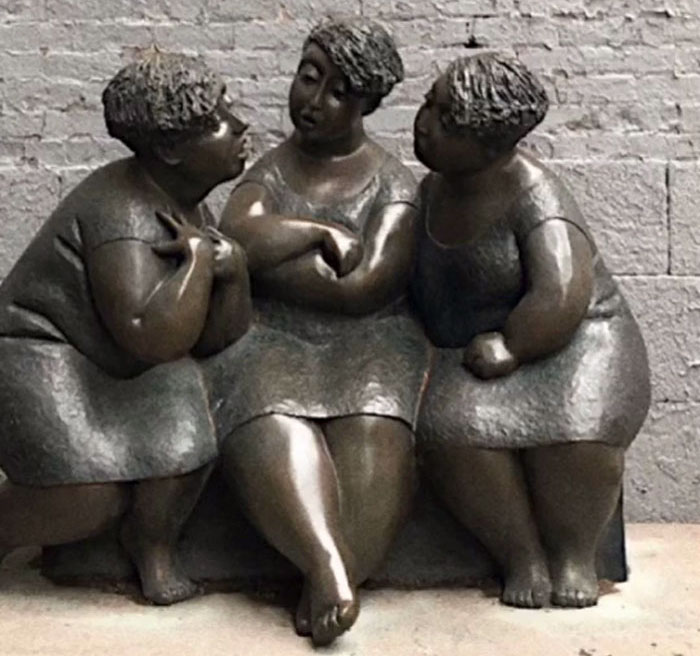



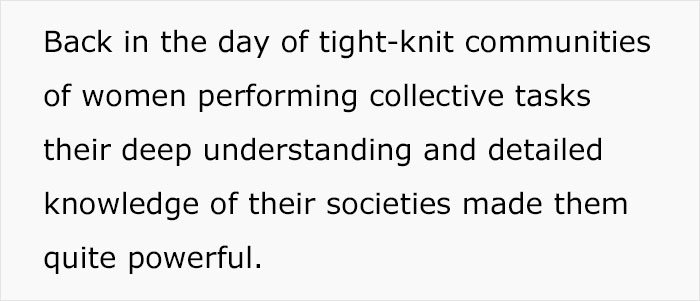




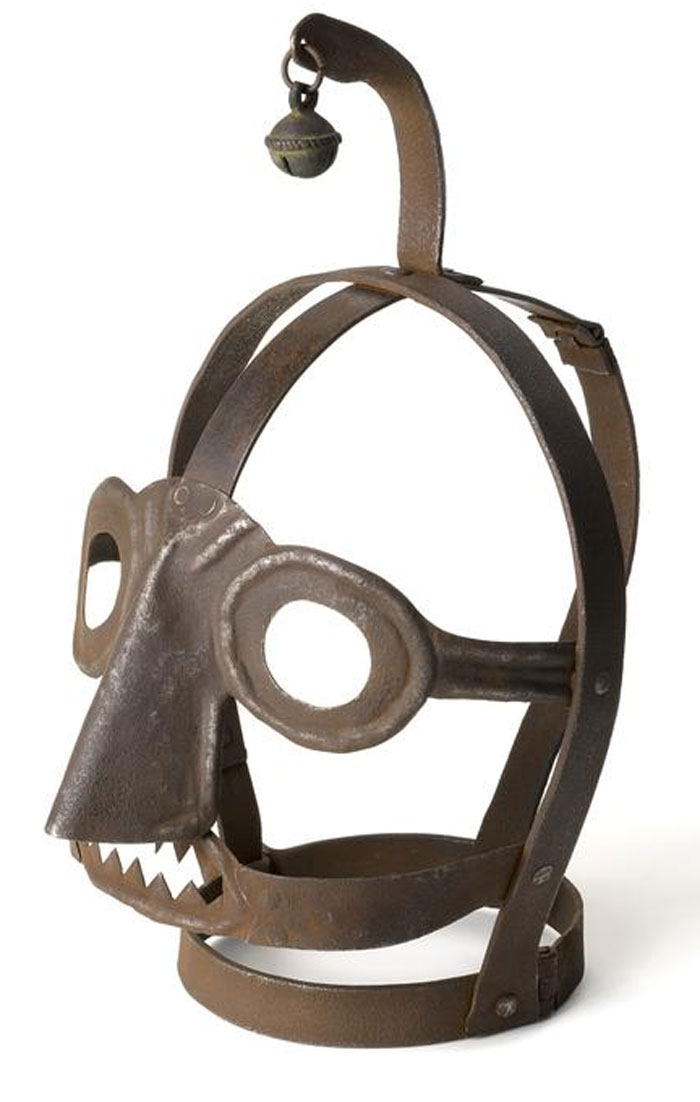

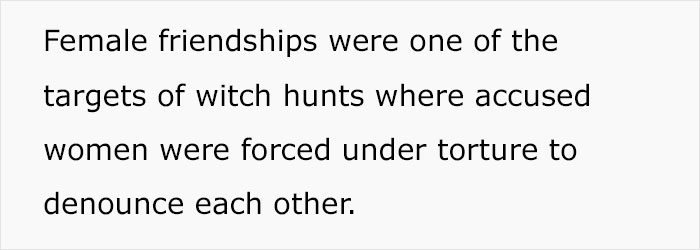








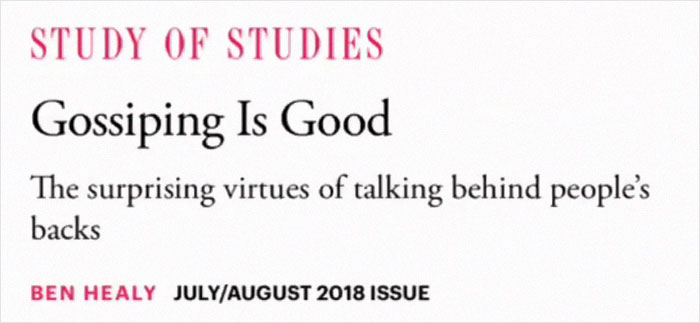

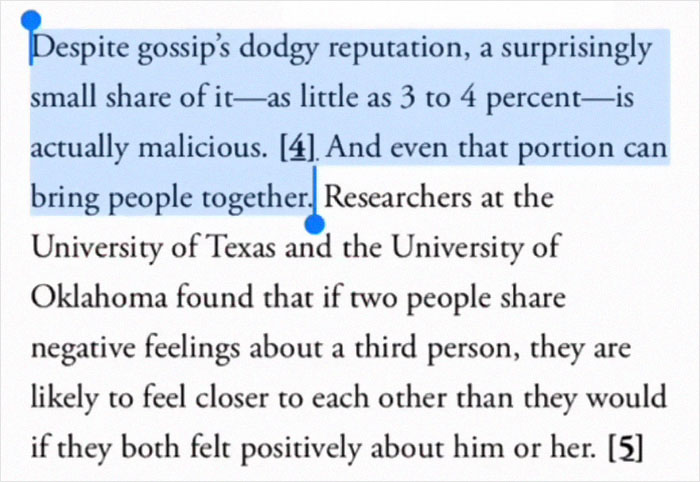

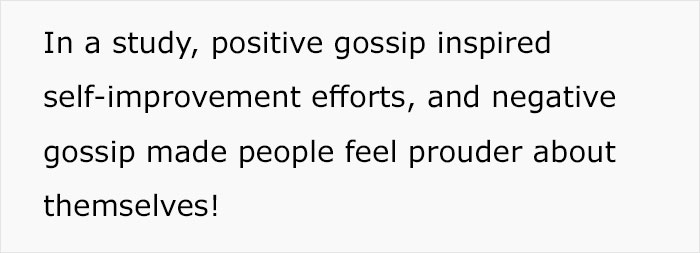

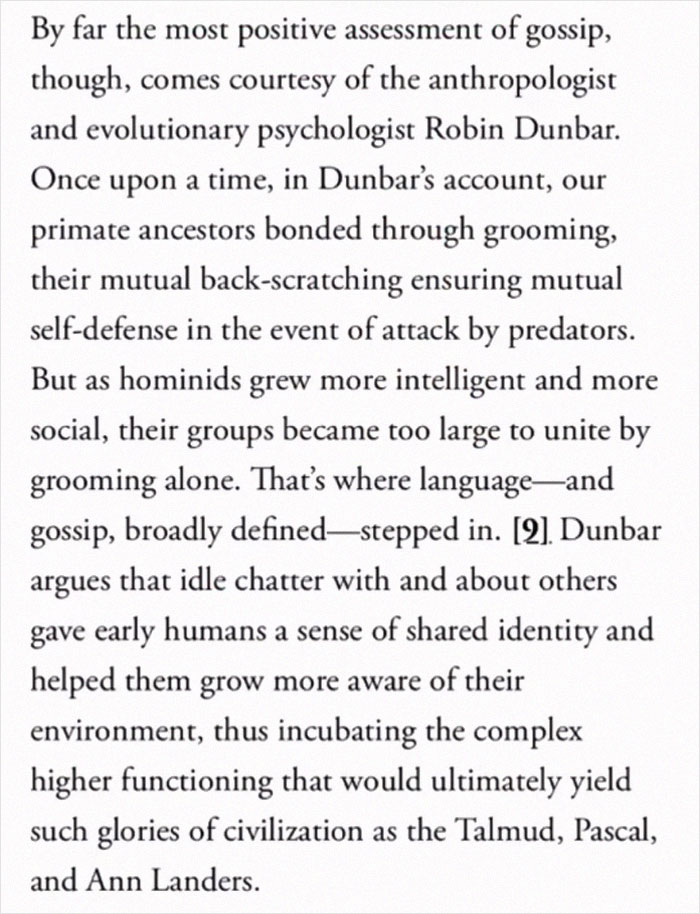





















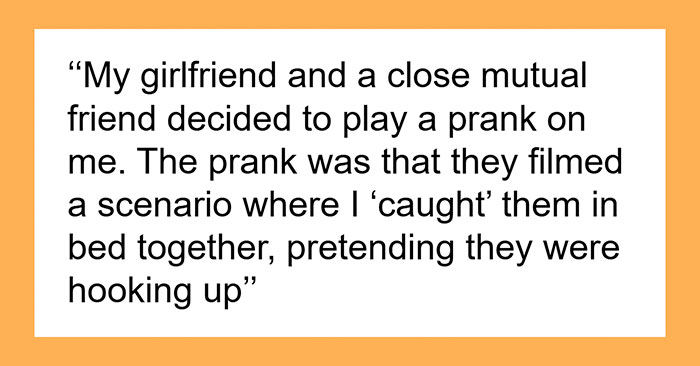




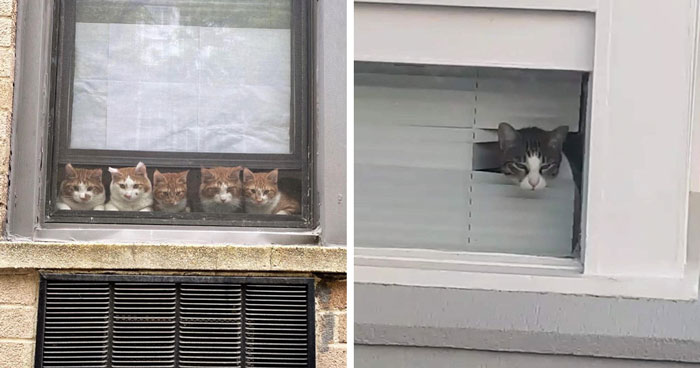









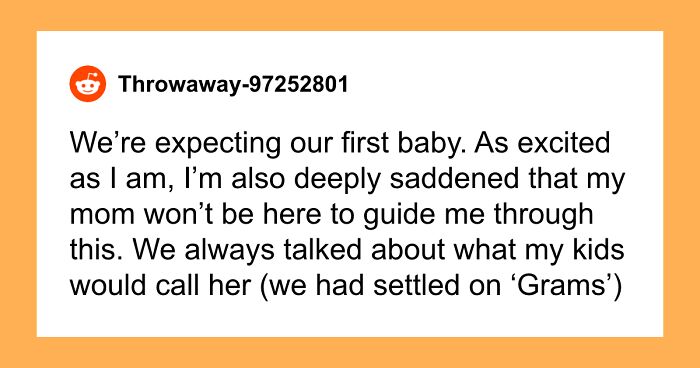

38
111